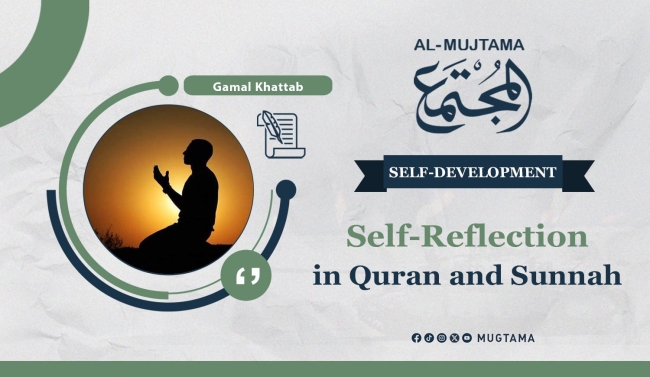Self-Reflection in Quran and Sunnah Featured
Islam regards self-reflection or introspection as a critical step for developing both the personal and spiritual aspects of one’s life. The Quran and the teachings of the Prophet Mohammad (peace and blessings be upon him) encourage self-reflection to get close to Allah, enhance a person’s character, and live a virtuous life. We’ll try here to discuss the place of self-reflection in the Quran and Sunnah and how people are taught in practice the significance of this aspect of life engagement.
Self-Reflection in the Quran
Islamic holy book, the Quran, has many verses that ask people to think about what they do and why they do it as well as things outside them. One of the key functions of the Quran is to show people how to find the right path and such an inward look is very important in that purview.
- Controversy on the Creation: Believers are constantly invited to think about the heavens and the earth to appreciate the might of Allah and their longitude in this universe. For example, Allah says in Surah Al-Imran:
“Indeed, in the creation of the heavens and the earth and the alternation of the night and the day are signs for those of understanding.” (Quran 3:190)
This verse implores Muslims of the outdoors to bring inward the dynamic movement of nature each day making them aware and appreciative of the might of Allah.
- Self-Inquisition: The importance of self-examination and accountability is equally emphasized in the Holy Qur’an. For instance, in Surah Al-Hashr: Allah says, “O you who have believed, fear Allah. And let every soul look to what it has put forth for tomorrow…” (Quran 59:18)
This verse highlights the importance of weighing oneself against their actions, as well as the reasons behind those actions to ensure compliance with Islamic values2.
- Muraqabah (Mindful Awareness) Muraqabah or ‘mindful awareness’ has its origins in the Qur'an. It entails an awareness of Allah’s watchful eye at all times, monitoring one’s thoughts and deeds.
Such practice retains a sense of spatial and self-consciousness in one’s spiritual state3.
Self-Reflection in the Sunnah
Self-reflection has many practical instances in the Sunnah, which refers to the practices and teachings of Prophet Muhammad (peace be upon him). The life of the Prophet is an example in all such aspects for every Muslim of how such self-reflection could help an individual etch out space and grow – both physically and spiritually.
- independent thinking: Before the commencement of the prophetic mission, Muhammad (peace be upon him) used to go to the cave of Hira where he would spend the time thinking.
This activity of staying away from people and thinking on one’s own is not merely an exercise in frivolity but a true science of self-reflection that impacts deeply on the spiritual dimension.
- Everyday Activities: The holy Prophet (peace be upon him) practiced MuhaSabah in most of his daily activities. He would remain in Dhikr and Dua most of the time contemplating over the divine power and requesting assistance from the lord.
This practice is also recommended for every Muslim to live a spiritually healthy life.
- Supporting the Working of the Reflection Process in Others: The Prophet (PBUH) also encouraged a similar practice among his companions. He would often request them to assess the motives and deeds, for example, Prophet Mohammad (PBUH) says “Take account of yourselves before you are taken to account.” (Tirmidhi)
In this instance, the saying illustrates the value of one’s self-examination and self-judgment under the auspices of one’s overtly attractive moral code.
Nevertheless, Self-Reflection is advantageous in many aspects
Self-reflection is beneficial to Muslims in physically and spiritually different ways.
- Spiritual Growth: Self-refection is a means of assessing one’s strengths and weak points as a person which is an important component of seeking one’s forgiveness and improving for better oneself. It encourages one to become closer to Allah and increases one’s belief.
- Improved Character: By periodically assessing the status of their actions and intentions, Muslims can master such as humbleness, patience, and gratefulness. Self-assessment promotes moral standards and assists individuals in living in accordance with the Islamic ways.
- Emotion Regulation: Internal MEDITATION also assists in seeking of who one is, thus helping develop better emotional control over various situations. It helps the person to know the emotional aspect, face the situation, and keep a healthy and positive approach to life.
- Cultivating Healthy Connections: Self-assessment when looking at how a person behaves and relates to others enhances relationships. It nurtures compassion and comprehension and promotes effective communication, hence all the better creating a closer network with relatives, peers, and society at large.
Thinking about oneself is an important practice that is integral to Islamic belief and teachings present in the Quran and Sunnah. It is a means of achieving, spiritual elevation, improving an individual’s behavior and outlook, and leading a good life. Islam encourages practicing self-reflection daily to deepen their connection with Allah, improve their mental health, as well as have good interaction with other people. There are good reasons for these practices and Islam, the Quran, and the Sunnah, offer a broad scope towards them to assist the faithful in the everyday practice of self-improvement.
Sources:
-----------
https://www.muslimpro.com/self-reflection-practices-through-islam/


